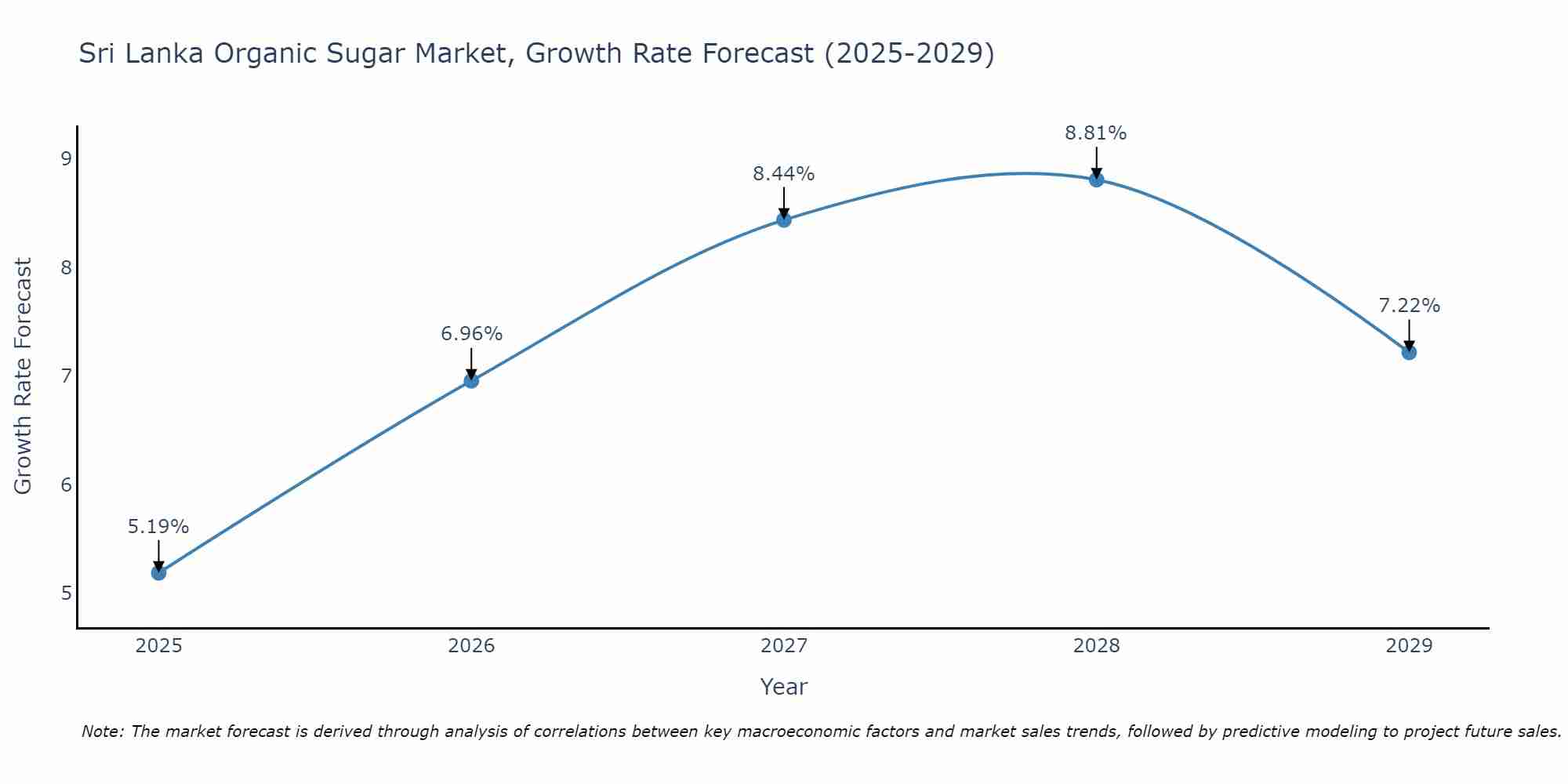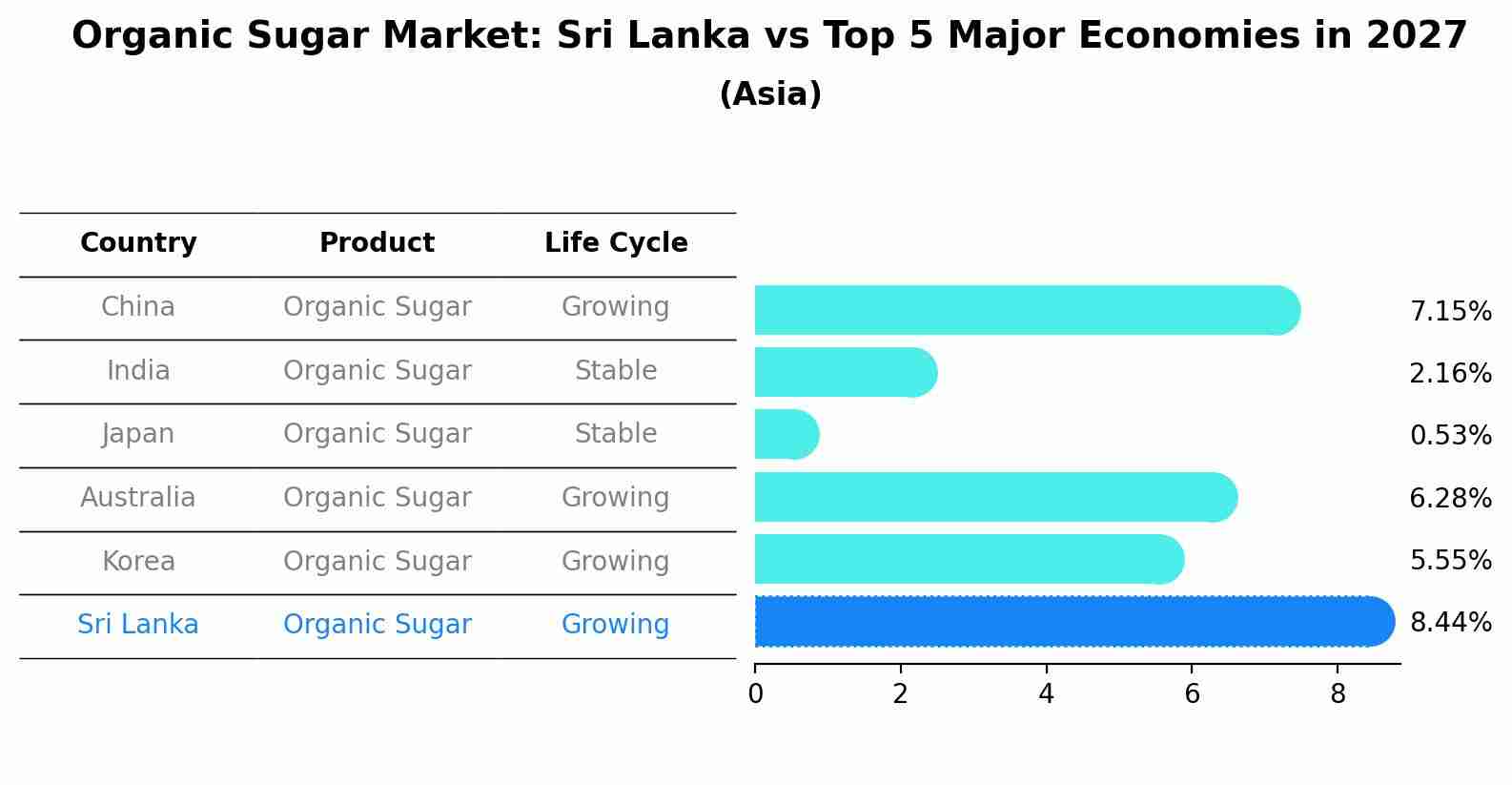Sri Lanka Organic Sugar Market Outlook | Companies, Trends, Industry, Revenue, COVID-19 IMPACT, Share, Size, Analysis, Value, Growth & Forecast
| Product Code: ETC109730 | Publication Date: Jun 2021 | Updated Date: Jun 2025 | Product Type: Report | |
| Publisher: 6Wresearch | Author: Sachin Kumar Rai | No. of Pages: 70 | No. of Figures: 35 | No. of Tables: 5 |
Sri Lanka Organic Sugar Market Size Growth Rate
The Sri Lanka Organic Sugar Market is projected to witness mixed growth rate patterns during 2025 to 2029. The growth rate begins at 5.19% in 2025, climbs to a high of 8.81% in 2028, and moderates to 7.22% by 2029.

Organic Sugar Market: Sri Lanka vs Top 5 Major Economies in 2027 (Asia)
The Organic Sugar market in Sri Lanka is projected to grow at a growing growth rate of 8.44% by 2027, within the Asia region led by China, along with other countries like India, Japan, Australia and South Korea, collectively shaping a dynamic and evolving market environment driven by innovation and increasing adoption of emerging technologies.

Sri Lanka Organic Sugar Market Overview
The Sri Lanka organic sugar market is experiencing growth driven by increasing consumer awareness of health and environmental issues. Consumers are increasingly seeking organic sugar as a healthier alternative to conventional sugar, free from synthetic chemicals and pesticides. This demand is further fueled by the rising trend of clean eating and sustainable practices. The market is characterized by the presence of both domestic producers and international players offering a variety of organic sugar products such as granulated sugar, powdered sugar, and liquid sweeteners. Key distribution channels include supermarkets, health food stores, and online retailers. As the organic food sector continues to expand in Sri Lanka, the organic sugar market is expected to grow steadily, presenting opportunities for both local and foreign companies to capitalize on the growing consumer preference for organic and natural sweeteners.
Sri Lanka Organic Sugar Market Trends
The Sri Lanka organic sugar market is currently experiencing a significant growth trend, driven by increasing consumer awareness about the health and environmental benefits of organic products. Consumers are increasingly seeking healthier and more sustainable alternatives to conventional sugar, leading to a rising demand for organic sugar in the country. The market is also being influenced by a growing trend towards organic and natural food products, as consumers become more conscious about the quality and sourcing of their food. Additionally, government initiatives to promote organic farming and sustainable agriculture practices are further fueling the growth of the organic sugar market in Sri Lanka. Overall, the market is poised for continued expansion as more consumers prioritize health, sustainability, and ethical consumption choices.
Sri Lanka Organic Sugar Market Challenges
In the Sri Lanka Organic Sugar Market, several challenges are faced by both producers and consumers. One major challenge is the limited awareness and understanding of the benefits of organic sugar among consumers, leading to lower demand compared to conventional sugar products. Additionally, the higher production costs associated with organic farming practices, such as certification, compliance, and lower yields, result in organic sugar being priced at a premium, further limiting its market penetration. Inadequate infrastructure and distribution channels for organic products also pose challenges in reaching a wider consumer base. Furthermore, the lack of consistent quality standards and certifications for organic sugar in Sri Lanka hinders consumer trust and confidence in the products, impacting market growth and competitiveness. Addressing these challenges through targeted marketing, education, and improved industry regulations can help promote the growth of the organic sugar market in Sri Lanka.
Sri Lanka Organic Sugar Market Investment Opportunities
The Sri Lanka organic sugar market presents various investment opportunities due to the increasing consumer demand for natural and healthier sweeteners. Investing in organic sugar production facilities, distribution networks, or retail outlets can be lucrative as more consumers are becoming conscious of the environmental and health benefits of organic products. Additionally, there is potential for growth in exports as the global demand for organic sugar continues to rise. Collaborating with local farmers to promote sustainable farming practices and expand organic sugar cultivation could also be a strategic investment. Overall, the Sri Lanka organic sugar market offers opportunities for investors to capitalize on the growing trend towards organic and sustainable food products.
Sri Lanka Organic Sugar Market Government Policy
The Sri Lankan government has implemented several policies to support the organic sugar market in the country. These policies include providing financial incentives and subsidies to encourage farmers to transition to organic farming practices, promoting sustainable agriculture through training programs and technical assistance, and setting standards and certifications to ensure the quality and authenticity of organic sugar products. Additionally, the government has also focused on promoting organic sugar exports by facilitating market access and participating in international trade agreements that support organic agriculture. Overall, these policies aim to drive growth in the organic sugar sector, promote environmental sustainability, and enhance the competitiveness of Sri Lankan organic sugar in both domestic and international markets.
Sri Lanka Organic Sugar Market Future Outlook
The future outlook for the Sri Lanka Organic Sugar Market looks promising as there is a growing trend towards organic and sustainable products globally. Consumers are becoming more conscious of their health and the environment, leading to an increased demand for organic sugar as a healthier alternative to conventional sugar. Sri Lanka`s favorable climate for sugarcane cultivation and the country`s increasing focus on organic farming practices further support the growth of the organic sugar market. Additionally, the government`s initiatives to promote organic agriculture and certification programs are likely to boost the production and export of organic sugar from Sri Lanka. Overall, the market is expected to experience steady growth in the coming years, driven by changing consumer preferences and a shift towards sustainable food choices.
Key Highlights of the Report:
- Sri Lanka Organic Sugar Market Outlook
- Market Size of Sri Lanka Organic Sugar Market, 2021
- Forecast of Sri Lanka Organic Sugar Market, 2027
- Historical Data and Forecast of Sri Lanka Organic Sugar Revenues & Volume for the Period 2018 - 2027
- Sri Lanka Organic Sugar Market Trend Evolution
- Sri Lanka Organic Sugar Market Drivers and Challenges
- Sri Lanka Organic Sugar Price Trends
- Sri Lanka Organic Sugar Porter's Five Forces
- Sri Lanka Organic Sugar Industry Life Cycle
- Historical Data and Forecast of Sri Lanka Organic Sugar Market Revenues & Volume By Source for the Period 2018 - 2027
- Historical Data and Forecast of Sri Lanka Organic Sugar Market Revenues & Volume By Sugar Beet for the Period 2018 - 2027
- Historical Data and Forecast of Sri Lanka Organic Sugar Market Revenues & Volume By Sugar Cane for the Period 2018 - 2027
- Historical Data and Forecast of Sri Lanka Organic Sugar Market Revenues & Volume By Others for the Period 2018 - 2027
- Historical Data and Forecast of Sri Lanka Organic Sugar Market Revenues & Volume By Application for the Period 2018 - 2027
- Historical Data and Forecast of Sri Lanka Organic Sugar Market Revenues & Volume By Food and Beverage for the Period 2018 - 2027
- Historical Data and Forecast of Sri Lanka Organic Sugar Market Revenues & Volume By Pharmaceutical for the Period 2018 - 2027
- Historical Data and Forecast of Sri Lanka Organic Sugar Market Revenues & Volume By Others for the Period 2018 - 2027
- Historical Data and Forecast of Sri Lanka Organic Sugar Market Revenues & Volume By Type for the Period 2018 - 2027
- Historical Data and Forecast of Sri Lanka Organic Sugar Market Revenues & Volume By Crystal Sugar for the Period 2018 - 2027
- Historical Data and Forecast of Sri Lanka Organic Sugar Market Revenues & Volume By Gelling Sugar for the Period 2018 - 2027
- Historical Data and Forecast of Sri Lanka Organic Sugar Market Revenues & Volume By Liquid Sugar for the Period 2018 - 2027
- Historical Data and Forecast of Sri Lanka Organic Sugar Market Revenues & Volume By Icing Sugar for the Period 2018 - 2027
- Sri Lanka Organic Sugar Import Export Trade Statistics
- Market Opportunity Assessment By Source
- Market Opportunity Assessment By Application
- Market Opportunity Assessment By Type
- Sri Lanka Organic Sugar Top Companies Market Share
- Sri Lanka Organic Sugar Competitive Benchmarking By Technical and Operational Parameters
- Sri Lanka Organic Sugar Company Profiles
- Sri Lanka Organic Sugar Key Strategic Recommendations
Frequently Asked Questions About the Market Study (FAQs):
- Single User License$ 1,995
- Department License$ 2,400
- Site License$ 3,120
- Global License$ 3,795
Search
Related Reports
- ASEAN and Thailand Brain Health Supplements Market (2025-2031) | Strategy, Consumer Insights, Analysis, Investment Trends, Opportunities, Growth, Size, Share, Industry, Revenue, Segments, Value, Segmentation, Supply, Forecast, Restraints, Outlook, Competition, Drivers, Trends, Demand, Pricing Analysis, Competitive, Strategic Insights, Companies, Challenges
- ASEAN Bearings Market (2025-2031) | Strategy, Consumer Insights, Analysis, Investment Trends, Opportunities, Growth, Size, Share, Industry, Revenue, Segments, Value, Segmentation, Supply, Forecast, Restraints, Outlook, Competition, Drivers, Trends, Demand, Pricing Analysis, Competitive, Strategic Insights, Companies, Challenges
- Europe Flooring Market (2025-2031) | Outlook, Share, Industry, Trends, Forecast, Companies, Revenue, Size, Analysis, Growth & Value
- Saudi Arabia Manlift Market (2025-2031) | Outlook, Size, Growth, Trends, Companies, Industry, Revenue, Value, Share, Forecast & Analysis
- Uganda Excavator, Crane, and Wheel Loaders Market (2025-2031) | Strategy, Consumer Insights, Analysis, Investment Trends, Opportunities, Growth, Size, Share, Industry, Revenue, Segments, Value, Segmentation, Supply, Forecast, Restraints, Outlook, Competition, Drivers, Trends, Demand, Pricing Analysis, Competitive, Strategic Insights, Companies, Challenges
- Rwanda Excavator, Crane, and Wheel Loaders Market (2025-2031) | Strategy, Consumer Insights, Analysis, Investment Trends, Opportunities, Growth, Size, Share, Industry, Revenue, Segments, Value, Segmentation, Supply, Forecast, Restraints, Outlook, Competition, Drivers, Trends, Demand, Pricing Analysis, Competitive, Strategic Insights, Companies, Challenges
- Kenya Excavator, Crane, and Wheel Loaders Market (2025-2031) | Strategy, Consumer Insights, Analysis, Investment Trends, Opportunities, Growth, Size, Share, Industry, Revenue, Segments, Value, Segmentation, Supply, Forecast, Restraints, Outlook, Competition, Drivers, Trends, Demand, Pricing Analysis, Competitive, Strategic Insights, Companies, Challenges
- Angola Excavator, Crane, and Wheel Loaders Market (2025-2031) | Strategy, Consumer Insights, Analysis, Investment Trends, Opportunities, Growth, Size, Share, Industry, Revenue, Segments, Value, Segmentation, Supply, Forecast, Restraints, Outlook, Competition, Drivers, Trends, Demand, Pricing Analysis, Competitive, Strategic Insights, Companies, Challenges
- Israel Intelligent Transport System Market (2025-2031) | Strategy, Consumer Insights, Analysis, Investment Trends, Opportunities, Growth, Size, Share, Industry, Revenue, Segments, Value, Segmentation, Supply, Forecast, Restraints, Outlook, Competition, Drivers, Trends, Demand, Pricing Analysis, Competitive, Strategic Insights, Companies, Challenges
- Uganda Precast and Aggregate Market (2025-2031) | Strategy, Consumer Insights, Analysis, Investment Trends, Opportunities, Growth, Size, Share, Industry, Revenue, Segments, Value, Segmentation, Supply, Forecast, Restraints, Outlook, Competition, Drivers, Trends, Demand, Pricing Analysis, Competitive, Strategic Insights, Companies, Challenges
Industry Events and Analyst Meet
Our Clients
Whitepaper
- Middle East & Africa Commercial Security Market Click here to view more.
- Middle East & Africa Fire Safety Systems & Equipment Market Click here to view more.
- GCC Drone Market Click here to view more.
- Middle East Lighting Fixture Market Click here to view more.
- GCC Physical & Perimeter Security Market Click here to view more.
6WResearch In News
- Doha a strategic location for EV manufacturing hub: IPA Qatar
- Demand for luxury TVs surging in the GCC, says Samsung
- Empowering Growth: The Thriving Journey of Bangladesh’s Cable Industry
- Demand for luxury TVs surging in the GCC, says Samsung
- Video call with a traditional healer? Once unthinkable, it’s now common in South Africa
- Intelligent Buildings To Smooth GCC’s Path To Net Zero













